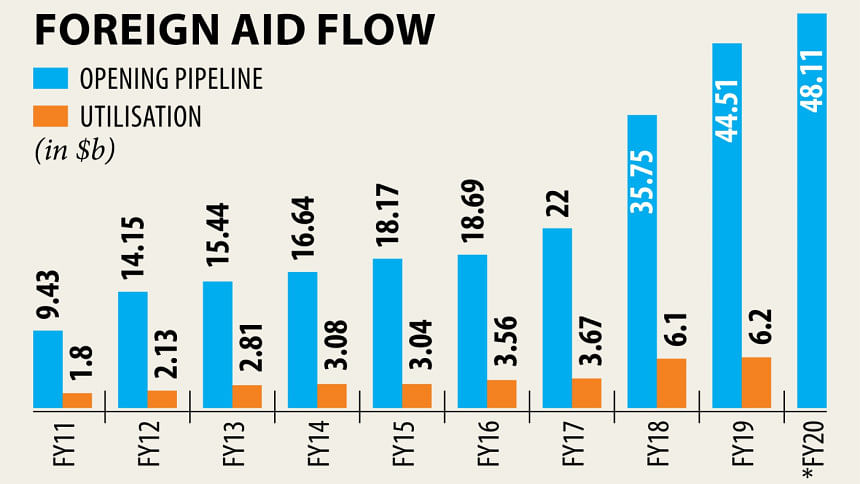Newly confident Bangladesh to flag off Development Forum

There was a time when Bangladeshi finance ministers would land in Paris with a briefcase in hand to seek financial assistance from donors.
It was a custom then that a poor country like Bangladesh will only beg for money and wealthy foreign nations would make commitments in Paris Consortium Meetings.
But things have changed. They are no more a donor. They are now development partners who come here to take part in the Bangladesh Development Forum (BDF) only to discuss strategies to materialise future development plans.
This year, the two-day forum will start tomorrow at the Bangabandhu International Conference Centre in Dhaka. Prime Minister Sheikh Hasina is scheduled to open the show, said Monowar Ahmed, secretary of the Economic Relations Division, at a press briefing at the NEC auditorium in the capital yesterday.
The last Paris Consortium Meeting, organised by the World Bank, was held in 2005. The meetings used to be presided over by the WB’s vice-president and Bangladesh’s finance minister.
The donors used to make commitments on how much they will give as financial help in the meetings, Ahmed said.
The process to extend assistance in this way was changed in 2005 as per recommendation of the Paris Declaration.
In the following two years, donors made commitments along with some conditions in events, which were called Poverty Reduction Strategy Forum.
In 2010, BDF began. Since then three BDFs took place, while the last one was organised in January 2018.
“No commitments are made now. Discussions are held on policies and programmes. Donors give suggestions. Leadership and ownership of the meetings have also changed,” Ahmed said.
Bangladesh received commitments worth $1.27 billion in fiscal 2004-05. The amount has increased to $6 billion to $7 billion in the last few years, and in last fiscal year the committed amount hit $9.8 billion.
The amount of unused foreign aid in the pipeline stood at $48.11 billion as of July 1, 2019.
The goal of this year’s BDF is partnering for sustainable development. The main plan will be highlighting the eighth Five-Year Plan to foreign donors, Ahmed said.
The country is nearing the end of implementing its seventh Five-Year Plan; steps have been initiated for formulating the next course of action: the eighth Five-Year Plan.
This year’s meeting will review what the effects of the previous plans and decide what will get priority in the upcoming plans, he said.
“How much financing the eighth Five-Year Plan will be needed will also be presented in the meeting.”
While Bangladesh has already met all the criteria for graduation back in March 2018, the UN triennial review of 2021 will very likely lead the country to graduate officially from the least-developed country bracket in 2024.
BDF 2020 is also important for Bangladesh because of its future economic graduation, he said, adding that graduation will not make foreign aids costlier as the donors set the loan interest based on per capita income.
This year’s meeting is dedicated in honour of Bangabandhu Sheikh Mujibur Rahman, as the nation is now taking preparation to celebrate the birth centenary of the Father of the Nation in 2020.
Eight sessions will be organised this year. One will be held to explore what reform measures Bangladesh needs to undertake to improve its investment climate and strengthen institutions that support the private sector as a means of improving competitiveness to attract both domestic and foreign investment.
This session will also attempt to identify appropriate policy options for trade facilitation and export diversification in light of Bangladesh’s LDC graduation.
One of the sessions will address how Bangladesh can innovate financing sources and mechanism through piloting new financing models.
The private sector may play a significant role in advancing towards the Sustainable Development Goals and contributing towards a smooth and sustainable LDC graduation.
This year, some 40 representatives of different development partners will join the BDF, including Junichi Yamada, senior vice-president of JICA; Hartwig Schafer, vice-president for the South Asian region of the World Bank; and Shixin Chen, vice-president of the Asian Development Bank.

 For all latest news, follow The Daily Star's Google News channel.
For all latest news, follow The Daily Star's Google News channel. 



Comments